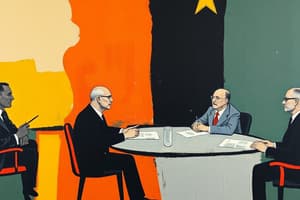Podcast
Questions and Answers
¿Cuáles fueron las principales potencias del Eje en la Segunda Guerra Mundial?
¿Cuáles fueron las principales potencias del Eje en la Segunda Guerra Mundial?
- Alemania, Italia y Japón (correct)
- Unión Soviética, China y Japón
- Estados Unidos, Unión Soviética y China
- Estados Unidos, Gran Bretaña y Francia
¿Cuál fue uno de los principales efectos de la Segunda Guerra Mundial en Europa?
¿Cuál fue uno de los principales efectos de la Segunda Guerra Mundial en Europa?
- La desaparición del Imperio Británico
- La creación de la Unión Europea
- La división de Europa en dos bloques: Occidental y Oriental (correct)
- La unificación de Europa bajo un solo gobierno
¿Cuál fue el principal factor que contribuyó al inicio de la Segunda Guerra Mundial?
¿Cuál fue el principal factor que contribuyó al inicio de la Segunda Guerra Mundial?
- La derrota de Alemania en la Primera Guerra Mundial
- El ascenso al poder de Adolf Hitler en Alemania (correct)
- La crisis económica de 1929
- El resurgimiento del nacionalismo en Europa
¿Cuál fue uno de los principales impactos de la Segunda Guerra Mundial en la población civil?
¿Cuál fue uno de los principales impactos de la Segunda Guerra Mundial en la población civil?
¿Cuál de los siguientes líderes fue el principal responsable de llevar a Europa a la Segunda Guerra Mundial?
¿Cuál de los siguientes líderes fue el principal responsable de llevar a Europa a la Segunda Guerra Mundial?
¿Qué líder desempeñó un papel crucial en la resistencia contra la agresión alemana durante la Segunda Guerra Mundial?
¿Qué líder desempeñó un papel crucial en la resistencia contra la agresión alemana durante la Segunda Guerra Mundial?
¿Cuál fue uno de los principales legados de la Segunda Guerra Mundial?
¿Cuál fue uno de los principales legados de la Segunda Guerra Mundial?
¿Qué factor contribuyó a la escalada de hostilidades antes de la Segunda Guerra Mundial?
¿Qué factor contribuyó a la escalada de hostilidades antes de la Segunda Guerra Mundial?
¿Cuál de las siguientes afirmaciones sobre las consecuencias de la Segunda Guerra Mundial es falsa?
¿Cuál de las siguientes afirmaciones sobre las consecuencias de la Segunda Guerra Mundial es falsa?
¿Cuál de las siguientes afirmaciones describe con precisión el impacto de la Segunda Guerra Mundial en la población civil?
¿Cuál de las siguientes afirmaciones describe con precisión el impacto de la Segunda Guerra Mundial en la población civil?
Flashcards are hidden until you start studying
Study Notes
World War II
World War II was the most widespread war in history, lasting from 1939 to 1945. It involved the Axis powers, led by Germany, Italy, and Japan, against the Allies, comprised of countries such as the United States, Great Britain, and the Soviet Union. This conflict had significant consequences in its aftermath.
Post-War Consequences
The end of World War II brought about several changes globally. In Europe, the continent rebuilt itself through the Marshall Plan, which provided economic aid to help restore and modernize Western European economies. However, Eastern Europe was divided into areas occupied by the USSR, forming what became known as the Iron Curtain.
In Asia, India gained independence from British rule, while China and Vietnam were embroiled in civil wars. The world entered a period of ideological conflict between capitalism and communism, leading to the Cold War.
Nuclear Age Dawns
One major consequence of World War II was the advent of nuclear weapons. During the war, both the United States and the Soviet Union developed atomic bombs, and their use cast a shadow over international relations for decades.
Causes
The roots of World War II can be traced back to the Treaty of Versailles, which ended World War I. Its harsh terms imposed upon Germany created resentment among the German people and sowed the seeds of instability. The rise of Germany under Adolf Hitler was facilitated by these conditions, culminating in his aggressive expansionist policies.
The Great Depression's Impact on World War II
The economic hardships of the Great Depression also played a role in the outbreak of war. Many countries experienced widespread unemployment and poverty, making their populations more willing to support authoritarian leaders who promised to restore stability and prosperity.
Ethnic Conflict Fueled the Fire
Ethnic conflict was another factor that contributed to the escalation of hostilities. In particular, the long-standing tensions between Poles and Germans, Serbs and Croats, and Jews and non-Jews were exploited by leaders seeking to expand their territories or protect their own populations.
Key Figures
Several individuals played pivotal roles during World War II, influencing its course and shaping its outcomes. Among these figures are:
- Adolf Hitler: Leader of Nazi Germany, he initiated aggressive expansionist policies and ultimately plunged Europe into war.
- Winston Churchill: Prime Minister of the United Kingdom, he rallied his country to resist German aggression and formed the Special Operations Executive (SOE), which carried out covert operations behind enemy lines.
- Joseph Stalin: Leader of the Soviet Union from 1928 until his death in 1953, Stalin's regime was responsible for millions of deaths due to famine, executions, and labor camps, yet it also played a crucial role in defeating Nazi Germany.
Impact on Civilians
World War II had a profound effect on civilian populations worldwide. Approximately 75 million to 90 million casualties occurred during the war due to combat and disease. Civilian populations experienced targeted policies and actions such as ethnic cleansings, forced migrations, mass bombings, and genocide.
The devastation caused by the war led to significant changes in international relations, economic systems, and societal structures. It also laid the foundation for the Cold War era, which dominated international relations until the Soviet Union's dissolution in 1991.
Studying That Suits You
Use AI to generate personalized quizzes and flashcards to suit your learning preferences.




